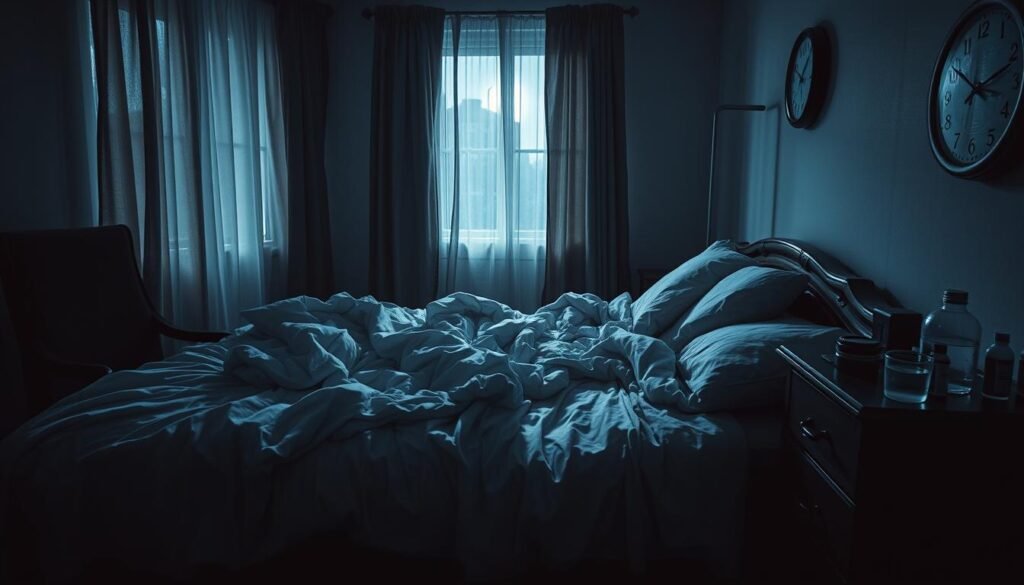Around half of the people getting cancer treatment have big sleep problems. These sleep issues are not rare in cancer patients. They deeply impact their healing and health. Getting enough good sleep is key. It helps clear your mind, keep blood pressure normal, makes you hungry, and strengthens your immune system. Cancer treatments often mess up how you sleep. So, it’s very important for those affected to understand and deal with these problems.
We will explore how cancer, insomnia, and dealing with it all are connected. To know how sleep problems show up, we must look at things related to cancer and its treatment. This includes effects on sleep that affect how well treatment works and quality of life.
Key Takeaways
- Understanding sleep disturbances is critical for cancer patients.
- Cancer patients often experience insomnia, impacting recovery.
- Good sleep hygiene practices can significantly improve sleep quality.
- Various treatments can address sleep issues linked to cancer.
- Cognitive behavioral therapy is effective for managing insomnia.
Understanding Sleep Disorders
Sleep disorders impact our health deeply. Good sleep is key for our minds and bodies to work well. Not sleeping enough can make us forgetful, tired, and sick.
Importance of Sleep for Physical and Mental Health
Great sleep is important for health. Up to 95% of people with cancer have trouble sleeping. This is often because of the cancer or stress.
Sleep problems like insomnia are common in those with cancer. Not sleeping well can make us moody or even lead to long-term mood issues. Learn more about the importance of sleep.
Main Phases of Sleep: REM and NREM
Sleep has two important parts: REM and NREM. REM sleep is where we dream and process emotions. NREM sleep helps our bodies heal.
Problems with these sleep stages can make it hard for cancer patients to recover.
Common Types of Sleep Disorders
Many people with cancer have sleep troubles. Some common problems are:
- Insomnia – When it’s hard to fall or stay asleep.
- Sleep apnea – Breathing problems during sleep, which can be risky.
- Hypersomnia – Feeling too sleepy during the day.
- Circadian rhythm disorders – Sleep issues from our natural body clock being off.
- Parasomnia – Acting out in unusual ways while asleep, like sleepwalking.
These issues can make it really hard to sleep well. For example, obstructive sleep apnea can be especially dangerous for those with cancer. Knowing about different sleep disorders helps in treating them.
Insomnia and Cancer Connection
Insomnia and cancer are closely linked, with many reasons behind the sleep problems people face. Physical effects like pain, combined with the stress of knowing you have cancer, greatly affect sleep. Treatment side effects also play a role in sleep disturbances. It’s vital to understand this cancer connection to help those affected.
How Cancer Can Cause Sleep Disturbances
About half of all cancer patients have sleep issues, especially insomnia. Severe pain and depression often lead to more sleep problems. Treatments like hormone therapy disrupt sleep too. After chemotherapy, many experience insomnia, pointing to the widespread issue among patients. Dealing with the disease’s mental impact only makes sleep harder.
Prevalence of Insomnia in Cancer Patients
Insomnia rates in cancer patients are much higher than in the general population. Up to 59% of patients report serious trouble sleeping. Breast, gynecologic, and lung cancer patients face more sleep challenges. Improved sleep habits and relaxation techniques can help. For tips on managing sleep problems, visit this resource.
Cancer Causes Insomnia: The Underlying Factors
It’s vital to know why insomnia affects cancer patients. Both physical and emotional issues contribute to sleep problems. They make sleeping well harder and increase stress from fighting cancer.
Physical Changes Due to Cancer
Physical changes from tumors disrupt sleep. Pain makes it hard to get comfortable. Issues like stomach problems, fevers, and tiredness also interfere with sleep. These physical changes make it easy to see why many with cancer struggle with insomnia.
Emotional and Psychological Factors
The emotional impact of cancer is deep. Anxiety and depression, which harm sleep, are common. Stress from treatment decisions and fear of what lies ahead make it tough to relax at night. This creates a cycle where mental stress not only makes insomnia worse but also slows down healing. Studies show that 15% to 29% of cancer patients suffer from depression, much higher than the general population. This highlights the significant mental health struggles they face.
Treatment-Related Insomnia: Chemotherapy and Beyond
Cancer patients often face sleep problems due to treatments. These sleep issues can make recovery hard.
Effects of Chemotherapy on Sleep Quality
Chemotherapy can mess with your sleep. Nausea and fatigue often keep people awake. These problems make getting a good night’s sleep tough.
Bad sleep habits can make things worse, creating a cycle of tiredness. Many people find it hard to fall asleep or stay asleep.
Radiation Therapy Effects on Restful Sleep
Radiation therapy can also mess with sleep. Those treated near the bladder might wake up often to pee. It’s hard to stay asleep with this issue.
As treatment goes on, you might feel more tired. This can make insomnia worse.
Hormone Therapy and Its Sleep Disruptions
Hormone therapy causes its own sleep problems. Hot flashes and night sweats are common. These issues make it hard to sleep well.

| Treatment Type | Common Side Effects | Impact on Sleep Quality |
|---|---|---|
| Chemotherapy | Nausea, fatigue | Increased insomnia, difficulty falling asleep |
| Radiation Therapy | Fatigue, frequent urination | Disrupted sleep, awake often at night |
| Hormone Therapy | Hot flashes, night sweats | Increased difficulty in maintaining sleep |
Understanding how cancer treatments affect sleep helps manage insomnia. By knowing the causes, patients and doctors can improve sleep and recovery.
Other Contributing Factors to Sleep Disturbances
Many cancer patients face sleep troubles due to their complex health issues. Not just the illness, but also emotional and psychological stress, hurts their sleep.
Physical discomfort is another big problem for them. Studies show about half of the people with cancer have big sleep problems.
These issues often mix with anxiety and depression. This makes their condition tougher.
Anxiety Disorders and Depression Symptoms
For those fighting cancer, anxiety disorders and depression symptoms are big barriers to good sleep. The fear and worry from knowing they have cancer can disturb their rest.
Between 30 to 50 percent of those diagnosed have sleep troubles. They can’t sleep well or feel tired even after sleeping. This bad cycle of insomnia, anxiety, and depression needs special treatment to break.
Impact of Pain Management on Sleep
Handling pain management well is key to good sleep for cancer patients. If pain isn’t controlled, it can keep them up all night, making things worse.
Severe pain makes relaxing hard. This can make anxiety worse and mess up their sleep even more. Talking openly with doctors about pain solutions can really help them feel better.
Other Health Conditions Affecting Sleep
There are other health conditions affecting sleep in cancer treatment, too. Problems like sleep apnea, breathing issues, and side effects from treatment can stop restful sleep.
Healthcare teams work hard to fix these problems. They help with not just medical issues, but also emotional and physical ones. Their complete support is key to better sleep for patients.
Strategies to Manage Insomnia in Cancer Patients
Managing insomnia in cancer patients needs a mix of methods. Cognitive behavioral therapy for insomnia (CBT-I) is one effective way. It helps patients change their sleep thoughts and habits for better rest.
Cognitive Behavioral Therapy for Insomnia
Cognitive behavioral therapy, or CBT-I, helps those with sleep issues. It changes negative thoughts and behaviors about sleep into positive ones. Trained professionals craft personal plans, making it easier for patients to sleep well.
Importance of Sleep Hygiene
Good sleep hygiene means having habits that ensure sound sleep. This includes a regular sleep schedule and a calming bedroom environment. Avoiding screens before bed is also key. These steps can boost sleep quality for cancer patients struggling with insomnia.
Relaxation Techniques and Stress Management
Relaxation techniques also aid in sleeping better. Mindfulness, deep breaths, and guided images reduce stress and calm the mind. Managing stress well helps one sleep without interruption.

| Strategy | Description |
|---|---|
| Cognitive Behavioral Therapy | Reframes thoughts and behaviors to improve sleep patterns. |
| Sleep Hygiene | Establishes a conducive sleep environment and routine. |
| Relaxation Techniques | Includes mindfulness, breathing exercises, and guided imagery to alleviate anxiety. |
| Professional Support | Mental health professionals can help address emotional challenges related to insomnia. |
| Physical Activity | Engaging in regular light activity can promote better sleep quality. |
The Role of Circadian Rhythm Disruptions
Circadian rhythms work like our body’s clock. They help us know when to sleep and wake up. Poor sleep habits, stress, and shift work can mess this up. This really matters for cancer treatments because bad sleep can change the results.
Understanding Circadian Rhythms
Our body’s cycle affects sleep, hormones, and how our immune system works. Keeping a regular cycle is key for cancer patients’ recovery. More than half of them have trouble sleeping well. This problem raises cortisol levels, making stress harder to handle.
Impact of Disrupted Sleep Patterns on Recovery
Bad sleep can make cancer recovery harder. About 44% of patients feel very tired. They also deal with restless legs and can’t sleep well. Cancer patients face insomnia more often than others.
These sleep problems can cause mood swings and make thinking hard. Bad sleep is linked to feeling depressed and tired. Even after treatment, some feel tired for a long time.
It’s crucial to know what causes these sleep issues. By tackling these problems, patients can sleep better. This helps them feel better overall and supports their recovery. Check out this resource to learn more.
Long-Term Effects of Sleep Disturbances on Cancer Survivors
Sleep disturbances deeply impact cancer survivors long after treatment. Insomnia doesn’t just lower quality of life. It also raises risks for anxiety and depression. Survivors face emotional struggles due to ongoing sleep problems.
Increased Risks of Anxiety and Depression
Many cancer survivors face a higher chance of anxiety and depression from sleep issues. Studies show 20% to 30% suffer from fatigue and insomnia a year after treatment ends. This can lead to serious emotional distress, making their health issues worse. Especially women are more at risk, as treatment-related hormonal changes can worsen anxiety and depression.
Challenges in Everyday Functioning Due to Sleep Issues
Many cancer survivors find daily tasks hard because of sleep disturbances. Lack of sleep causes fatigue and irritability. This makes work and personal relationships tough. They struggle to do everyday activities effectively. An in-depth look at their sleep shows issues with starting and keeping sleep. Often, they sleep less than 85% of the time they’re in bed.

| Issue | Percentage of Affected Survivors | Potential Consequences |
|---|---|---|
| Fatigue and Insomnia | 20% – 30% | Decreased Quality of Life |
| Insomnia Symptoms | 30% – 50% | Increased Anxiety and Depression |
| Excessive Daytime Sleepiness | 28% | Impaired Everyday Functioning |
| Restless Legs | 41% | Difficulty in Sleep Quality |
It’s crucial to understand these long-term effects. Doing so helps create better support and interventions for survivors. Raising awareness about sleep disturbances leads to improved health outcomes for them.
Research on Sleep and Cancer Treatment
The link between sleep and cancer treatment is getting a lot of focus lately. Studies show that better sleep leads to better outcomes for patients. In particular, more than 15% of lung cancer patients have trouble sleeping. This highlights the importance of finding ways to help them sleep better.
Findings from Recent Studies
Not getting enough sleep, or getting too much, might increase the risk of lung cancer. Those with obstructive sleep apnea (OSA) also face issues. Their oxygen levels drop, which might help tumors grow. These facts show how crucial sleep is for cancer patients’ health and symptom management.
Potential Benefits of Improving Sleep for Patients
Lifestyle changes like losing weight can make a big difference in sleep quality for people with OSA. Using devices for sleep apnea and therapy for insomnia can improve sleep. This leads to better compliance with treatment and benefits for patients.
By focusing on these methods, we can boost the well-being of patients. This could also help with their cancer recovery and chances of survival.
Conclusion
Cancer and sleep problems are closely linked. Nearly 40% of people who survive cancer struggle with sleep for up to five years after their diagnosis. This poor sleep can make recovery harder. It causes tiredness, worry, and a drop in life quality.
Between 30% and 50% of those with cancer have trouble sleeping. Reports show insomnia is common in these patients.
It’s key to treat these sleep issues right. Cognitive Behavioral Therapy for Insomnia (CBT-I) is a top choice. It helps improve sleep and related symptoms, aiding in patient recovery. Also, managing disrupted sleep patterns can lower cancer risks. So, healthcare workers need to focus on sleep in cancer care.
Understanding the role of sleep patterns helps in treating cancer better. This ensures patients get the best care as they battle cancer.
Making sleep quality a priority in cancer treatment is essential. By using the right strategies, we can boost patients’ well-being. This could also improve their health in the long run. For more on how sleep affects cancer, check out original studies on this topic.